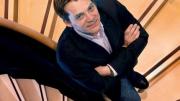A very long bookshelf in Jens Meierhenrich’s Harvard office holds a complete transcript of the Nuremberg trial of major war criminals, in 42 volumes. “I had to break the bank to buy them,” he says. But these are essential references for the German-born, 33-year-old scholar, who tells students that his “interest in genocide is both professional and personal”; much of his research on genocide and transitional justice is about “finding a lens to revisit my own country’s history.” Meierhenrich, an assistant professor of government and of social studies since 2005, has peered through that lens in South Africa and Rwanda and at the International Criminal Tribunal for the Former Yugoslavia in The Hague. This fall, in Japan, he’ll investigate the Tokyo tribunalGeneral MacArthur’s response to Japanese atrocities during World War II. Beginning in 2008, Princeton will publish Meierhenrich’s interdisciplinary trilogy on genocide. “I’m little concerned about morality tales. We are all outraged by genocide,” he says. “We need to understand not only why people kill, but how they kill. Victims in the Armenian genocide, for example, were crucified and had crosses tattooed on their foreheads. In Rwanda, certain bodies were dumped in the river, sending them, symbolically, ‘back to Ethiopia.’ You can transmit a message in the way you kill.” Meierhenrich has no bachelor’s degree, but after working for nearly two years at research centers in South Africa, he won a Rhodes Scholarship to Oxford, where he earned a D.Phil. in politics and international relations. Next came Columbia, and then the Kennedy School of Government. In 2002, he took a group of undergraduates to Rwanda for two months. This summer, he’s doing it again.
Jens Meierhenrich
Jens Meierhenrich
A very long bookshelf in Jens Meierhenrich’s Harvard office holds a complete transcript of the Nuremberg trial of major war criminals, in...

Jens Meierhenrich
Photograph by Fred Field
Explore More From Current Issue

Bees and Flowers Are Falling Out of Sync
Scientists are revisiting an old way of thinking about extinction.

These Harvard Mountaineers Braved Denali’s Wall of Ice
John Graham’s Denali Diary documents a dangerous and historic climb.

The True Cost of Grade Inflation at Harvard
How an abundance of A’s created “the most stressed-out world of all.”


